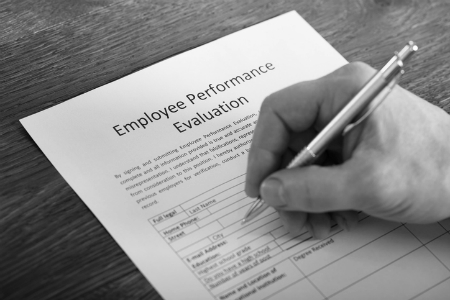A Better Tool Than KPIs For Employee Performance Management
by Stacey Barr |Too many organisations still manage employee performance with annual KPIs. Overwhelming evidence proves it doesn’t work. What’s needed is ‘performance forward’ conversations.

KPI is a term that originally was used to describe the most critical performance measures of business performance. Somehow the same term was adopted to mean the measures of individual people’s performance, in their 6-monthly or annual performance review.
Fundamentally, I disagree that we should measure individual people’s performance. That’s for several reasons, the biggest of which are:
- it’s based on a faulty assumption that we can isolate individual performance from the complexity of organisations
- to compensate for faulty assumptions, we then see it drives the wrong behaviours in people (not learning, but defensiveness)
- because people are competing and defending themselves against unfair KPIs, rather than collaborating and learning, performance ends up on a downward spiral
- and rarely is business performance truly constrained by people; mostly it’s constrained by processes (as are the people)
Don’t get me wrong; I do agree with managing people. However, I’m no expert (or even a novice) in that space. But Georgia Murch is, and she has a supremely better tool for managing people than KPIs ever could be. It’s a tool that is simple, elegant, respectful, and it works.

Georgia Murch is a best-selling author, a trainer and a keynote speaker. She is Australia’s expert in creating feedback cultures. Georgia has written two great books about feedback, Feedback Flow and Fixing Feedback. And her 25 years of experience consulting and leading teams and organisations means she really gets the complexity of managing people.
Georgia reminds us that the commonly used employee performance review approach came from the 1940s. So, many organisations are still using a method that is outdated by nearly 80 years. We’ve learned a lot since then, organisational culture has changed, and the old method no longer serves the purpose.
“I think there should be opportunities for people to have conversations about their performance, but I don’t think capturing them in one annual or biannual format is the right way to do it.”
Georgia points out there are several specific problems with such infrequent review:
- The feedback is stale: people save their conversations for the six-monthly or yearly reviews, and the specifics of situations are forgotten, so opinions replace objective information
- The feedback is “tell” oriented: infrequent reviews mean a lot of perspectives about the employee’s performance have to be crammed in, and there’s little time for good dialogue
- It’s a scoring exercise: KPIs are simple rankings or ratings and they trivialise the quality of feedback about true performance and how it can be improved
- Too much preparation is needed: Adobe found that 80,000 work hours were used each year just to prepare for annual reviews (they’ve subsequently ditched them)
- No-one enjoys them: they are awkward, stiff, uncomfortable and boring (like many first dates, Georgia explains)
The traditional approach is undignifying, for everyone involved. Conversations about individual employee performance need to be individualised to be constructive. They need to create an atmosphere of trust, honest reflection, collaborative problem solving, and focus on what next. Georgia recommends:
“If we focus on what I call ‘performance forwards’, like a conversation about our future and where we’re headed and how we can improve on what we’re doing and who we are, and we create opportunities to have regular catch-ups with our people, that’s where engagement grows.”
Trivial ranking and rating KPIs do not serve this kind of ‘performance forward’ feedback conversation. They demoralise it. That’s not to say that performance measurement plays no role in feedback conversations. When you adopt this definition of accountability, you have the right context to bring KPIs into the conversation.
Georgia has another idea for how KPIs can be a more
meaningful part of performance conversations. Find out in my full interview with Georgia Murch, right here:
Don’t manage employee performance with annual KPIs; create feedback culture for regular, respectful dialogue.
[tweet this]
DISCUSSION:
What role do KPIs play in performance reviews in your organisation or business? What’s working? What ideas from Georgia do you think could make them work better?
Connect with Stacey
Haven’t found what you’re looking for? Want more information? Fill out the form below and I’ll get in touch with you as soon as possible.
167 Eagle Street,
Brisbane Qld 4000,
Australia
ACN: 129953635
Director: Stacey Barr




